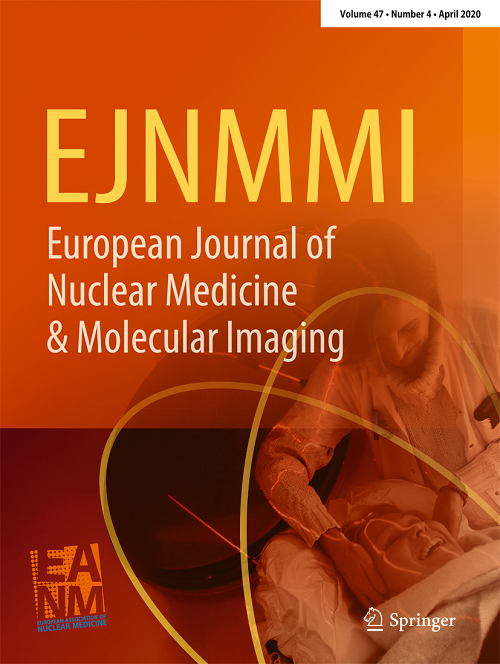Low-dose temozolomide selectively increases glioblastoma's vascular permeability, tumor microenvironment penetration and the killing potential of systemic actinium-225 α-particle dendrimer-radioconjugates improving treatment efficacy.
IF 8.6
1区 医学
Q1 RADIOLOGY, NUCLEAR MEDICINE & MEDICAL IMAGING
European Journal of Nuclear Medicine and Molecular Imaging
Pub Date : 2025-05-14
DOI:10.1007/s00259-025-07332-w
引用次数: 0
Abstract
PURPOSE The poor prognosis of glioblastoma is mostly due to the relatively low tumor vascular permeability to therapeutics, the tumor's vicinity to the brain, that limits treatment aggressiveness, and/or drug resistance. METHODS In this study, the efficacy of systemically injected actinium-225 dendrimer-radioconjugates was evaluated in an immune-competent orthotopic GL261-C57BL/6 mouse model after administration of low-dose, standard-of-care temozolomide, that selectively increased the tumor vascular permeability to dendrimer-radioconjugates. Alpha-particles' short range in tissue combined with the dendrimers' selective uptake by glioblastomas, could limit the irradiation of the neighboring brain, while the complex double-strand DNA breaks caused by α-particles were expected to be largely impervious to resistance by cancer cells. RESULTS On mice bearing 9.7 ± 5.7mm3 brain tumors, at activities that did not cause long-term (11-months) toxicities, dendrimer-radioconjugates, that were systemically-administered 24-hours after injection of temozolomide, significantly improved survival compared to dendrimer-radioconjugates alone (44 vs. 39 days mean survival, p = 0.0017) and/or compared to temozolomide alone and/or to non-treated animals (31 and 30 days, p < 0.001). This was attributed to: (1) the noteworthy increase (by 33%) in tumor absorbed doses delivered by dendrimer-radioconjugates when injected after chemotherapy, without altering normal organ (including the brain's) dosimetry; (2) the potentially deeper tumor penetration of dendrimer-radioconjugates, suggested by the enhanced dendrimer penetration within GL261-spheroids, employed as model tumor-avascular regions; and/or (3) the formation of a more lethal cocktail when both modalities acted on same cancer cells. CONCLUSIONS This study demonstrates the potential and safety of actinium-225 dendrimer-radioconjugates as a systemic α-particle radiotherapy for glioblastoma enhanced by low-dose temozolomide.低剂量替莫唑胺选择性增加胶质母细胞瘤的血管通透性、肿瘤微环境穿透性和全身锕-225 α-粒子树突状放射偶联物的杀伤潜力,提高治疗效果。
目的胶质母细胞瘤预后差主要是由于肿瘤血管对治疗药物的渗透性较低,肿瘤靠近大脑,限制了治疗的侵袭性和/或耐药性。方法在免疫功能正常的GL261-C57BL/6小鼠模型中,在给予低剂量的替莫唑胺后,系统注射锕-225树突状放射缀合物,以选择性地增加肿瘤血管对树突状放射缀合物的通透性。α-颗粒在组织中的短距离结合树突状分子被胶质母细胞瘤选择性摄取,可以限制对邻近大脑的照射,而α-颗粒引起的复杂双链DNA断裂预计在很大程度上不受癌细胞抵抗的影响。结果对于患有9.7±5.7mm3脑肿瘤的小鼠,在未引起长期(11个月)毒性的活动中,在注射替莫唑胺后24小时系统给予树突状分子-放射性偶联物,与单独树突状分子-放射性偶联物相比(44天和39天,p = 0.0017)和/或与单独替莫唑胺和/或未治疗的动物相比(31天和30天,p < 0.001)显着提高了生存率。这是由于:(1)在化疗后注射树突放射缀合物时,肿瘤吸收剂量显著增加(33%),而不改变正常器官(包括大脑)的剂量测定;(2)作为肿瘤无血管区模型,树突-放射性缀合物在gl261球体内的穿透性增强,表明树突-放射性缀合物可能具有更深的肿瘤穿透性;和/或(3)当两种方式作用于相同的癌细胞时,形成更致命的鸡尾酒。结论小剂量替莫唑胺增强锕-225树突状分子放射偶联物作为系统性α-粒子放疗治疗胶质母细胞瘤的潜力和安全性。
本文章由计算机程序翻译,如有差异,请以英文原文为准。
求助全文
约1分钟内获得全文
求助全文
来源期刊
CiteScore
15.60
自引率
9.90%
发文量
392
审稿时长
3 months
期刊介绍:
The European Journal of Nuclear Medicine and Molecular Imaging serves as a platform for the exchange of clinical and scientific information within nuclear medicine and related professions. It welcomes international submissions from professionals involved in the functional, metabolic, and molecular investigation of diseases. The journal's coverage spans physics, dosimetry, radiation biology, radiochemistry, and pharmacy, providing high-quality peer review by experts in the field. Known for highly cited and downloaded articles, it ensures global visibility for research work and is part of the EJNMMI journal family.

 求助内容:
求助内容: 应助结果提醒方式:
应助结果提醒方式:


